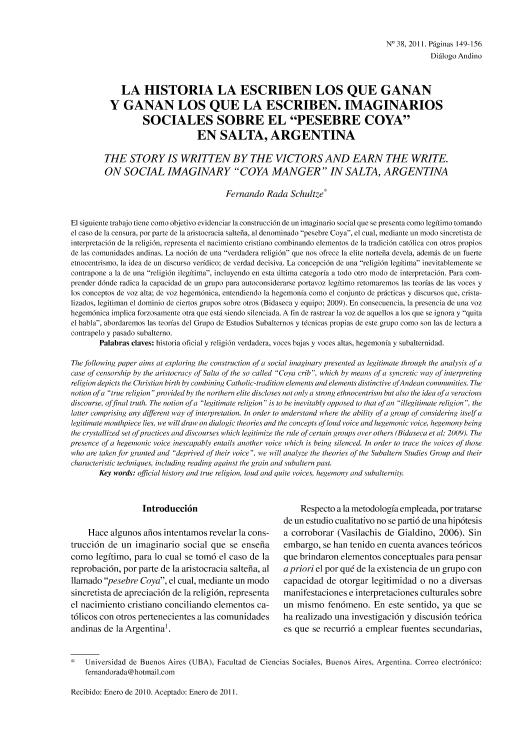Mostrar el registro sencillo del ítem
dc.contributor.author
Rada Schultze, Fernando

dc.date.available
2023-04-17T13:47:31Z
dc.date.issued
2011-12
dc.identifier.citation
Rada Schultze, Fernando; La historia la escriben los que ganan y ganan los que la escriben: imaginarios sociales sobre el "Pesebre Coya" en Salta, Argentina; Universidad de Tarapacá; Diálogo Andino; 38; 12-2011; 149-156
dc.identifier.issn
0716-2278
dc.identifier.uri
http://hdl.handle.net/11336/194134
dc.description.abstract
El siguiente trabajo tiene como objetivo evidenciar la construcción de un imaginario social que se presenta como legítimo tomando el caso de la censura, por parte de la aristocracia salteña, al denominado “pesebre Coya”, el cual, mediante un modo sincretista de interpretación de la religión, representa el nacimiento cristiano combinando elementos de la tradición católica con otros propios de las comunidades andinas. La noción de una “verdadera religión” que nos ofrece la elite norteña devela, además de un fuerte etnocentrismo, la idea de un discurso verídico; de verdad decisiva. La concepción de una “religión legítima” inevitablemente se contrapone a la de una “religión ilegítima”, incluyendo en esta última categoría a todo otro modo de interpretación. Para comprender dónde radica la capacidad de un grupo para autoconsiderarse portavoz legítimo retomaremos las teorías de las voces y los conceptos de voz alta; de voz hegemónica, entendiendo la hegemonía como el conjunto de prácticas y discursos que, cristalizados, legitiman el dominio de ciertos grupos sobre otros (Bidaseca y equipo; 2009). En consecuencia, la presencia de una voz hegemónica implica forzosamente otra que está siendo silenciada. A fin de rastrear la voz de aquellos a los que se ignora y “quita el habla”, abordaremos las teorías del Grupo de Estudios Subalternos y técnicas propias de este grupo como son las de lectura a contrapelo y pasado subalterno.
dc.description.abstract
The following paper aims at exploring the construction of a social imaginary presented as legitimate through the analysis of a case of censorship by the aristocracy of Salta of the so called “Coya crib”, which by means of a syncretic way of interpreting religion depicts the Christian birth by combining Catholic-tradition elements and elements distinctive of Andean communities. The notion of a “true religion” provided by the northern elite discloses not only a strong ethnocentrism but also the idea of a veracious discourse, of final truth. The notion of a “legitimate religion” is to be inevitably opposed to that of an “illegitimate religion”, the latter comprising any different way of interpretation. In order to understand where the ability of a group of considering itself a legitimate mouthpiece lies, we will draw on dialogic theories and the concepts of loud voice and hegemonic voice, hegemony being the crystallized set of practices and discourses which legitimize the rule of certain groups over others (Bidaseca et al; 2009). The presence of a hegemonic voice inescapably entails another voice which is being silenced. In order to trace the voices of those who are taken for granted and “deprived of their voice”, we will analyze the theories of the Subaltern Studies Group and their characteristic techniques, including reading against the grain and subaltern past.
dc.format
application/pdf
dc.language.iso
spa
dc.publisher
Universidad de Tarapacá
dc.rights
info:eu-repo/semantics/openAccess
dc.rights.uri
https://creativecommons.org/licenses/by-nc-sa/2.5/ar/
dc.subject
HISTORIA OFICIAL Y RELIGIÓN VERDADERA
dc.subject
VOCES BAJAS Y VOCES ALTAS
dc.subject
HEGEMONÍA Y SUBALTERNIDAD
dc.subject.classification
Antropología, Etnología

dc.subject.classification
Sociología

dc.subject.classification
CIENCIAS SOCIALES

dc.title
La historia la escriben los que ganan y ganan los que la escriben: imaginarios sociales sobre el "Pesebre Coya" en Salta, Argentina
dc.title
The story is written by the victors and earn the write: on social imaginary “Coya Manger” in Salta, Argentina
dc.type
info:eu-repo/semantics/article
dc.type
info:ar-repo/semantics/artículo
dc.type
info:eu-repo/semantics/publishedVersion
dc.date.updated
2023-04-14T15:50:23Z
dc.journal.number
38
dc.journal.pagination
149-156
dc.journal.pais
Chile

dc.journal.ciudad
Arica
dc.description.fil
Fil: Rada Schultze, Fernando. Consejo Nacional de Investigaciones Científicas y Técnicas; Argentina. Universidad de Buenos Aires. Facultad de Ciencias Sociales; Argentina
dc.journal.title
Diálogo Andino
dc.relation.alternativeid
info:eu-repo/semantics/altIdentifier/url/http://dialogoandino.cl/index.php/numero-38-2011-2/
Archivos asociados
